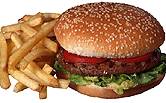
FRIDAY, Jan. 17, 2014 (HealthDay News) — Fast-food consumption is often blamed for the epidemic of overweight and obesity among U.S. children. But a new study finds that poor eating the rest of the day is most strongly linked with weight issues.
“While reducing fast food is important to improve dietary quality, we [also] need to focus on the rest of the diet,” said study researcher Jennifer Poti, a doctoral candidate in nutritional epidemiology at the University of North Carolina, Chapel Hill.
The children in the study who ate fast food were more likely to eat a typical unhealthy Western diet the rest of the day, Poti found.
The study, published in the January issue of the American Journal of Clinical Nutrition, was supported by the Robert Wood Johnson Foundation and the U.S. National Institutes of Health. No funding from the fast-food industry was involved.
The findings are a call for better overall nutrition education, said Connie Diekman, director of university nutrition at Washington University in St. Louis. Diekman reviewed the findings but did not take part in the study.
“The fact that fast-food diners — especially adolescents — tend to choose nutrient-poor foods outside of the fast-food meal demonstrates the need for better nutrition education and a focus on the whole diet to meet health needs,” Diekman said.
The researchers used 2007 to 2010 data from the U.S. National Health and Nutrition Examination Survey. They studied nearly 4,500 U.S. kids aged 2 to 18. The children or their parents completed two different 24-hour food-recall diaries, describing what they ate and drank.
Half of the children ate fast food, with nearly 40 percent of kids eating up to 30 percent of their total calories from fast food. About 10 percent of the children consumed more than 30 percent of their calories from fast food.
The strongest link the researchers found was between the remainder of a kid’s diet and weight issues — not the fast food alone. The connection between the remainder of the diet and overweight or obesity held even after they took kids’ physical activity into account, Poti said.
Of course, fast food isn’t entirely off the hook, she said.
“Fast food is still a very important factor and associated with poor diet quality and overweight and obesity,” Poti said. “When we think about trying to improve our child’s diet, we need to think about all the places our kids eat, and encourage better choices.”
Among the children who got more than 30 percent of their calories from fast food and ate a Western diet — which includes more soda and salty snacks and less milk and fruit — the remainder of the day, 40 percent were overweight or obese, Poti said.
Meanwhile, 28 percent of those who did not eat fast food and followed a more prudent diet plan — a lower intake of soda and chips and higher consumption of milk and fruit — had weight problems.
More information
To help kids make healthier fast-food choices, see the American Heart Association.
Copyright © 2026 HealthDay. All rights reserved.

